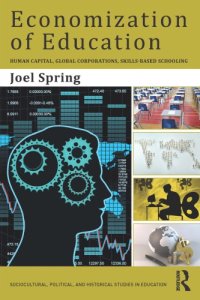
Ebook: Economization of Education: Human Capital, Global Corporations, Skills-Based Schooling
Author: Joel Spring
- Tags: Economics, Banks & Banking, Commerce, Commercial Policy, Comparative, Development & Growth, Digital Currencies, Econometrics, Economic Conditions, Economic History, Economic Policy & Development, Environmental Economics, Free Enterprise, Income Inequality, Inflation, Interest, Labor & Industrial Relations, Macroeconomics, Microeconomics, Money & Monetary Policy, Public Finance, Sustainable Development, Theory, Unemployment, Urban & Regional, Business & Money, Industries, Agriculture, Automotive, Computers & Technology, Const
- Series: Sociocultural Political and Historical Studies in Education
- Year: 2015
- Publisher: Routledge
- Edition: 1
- Language: English
- pdf
In this timely, cogent analysis of trends and powerful forces shaping global educational policy today, Joel Spring focuses on how economization is making economic growth and increased productivity the main goals of schools, and the ways these goals are achieved―including measuring educational policies by their costs and economic benefits, shaping family life to ensure productive workers and high-achieving students, introducing entrepreneurship education into curricula from preschool through higher education, and increasing the involvement of economists in educational policy analysis. Close attention is given to the Organization for Economic Cooperation and Development (OECD), the World Bank, the World Economic Forum, and multinational corporations, which, as advocates of economization, want schools to focus on teaching hard and soft skills needed by the global labor market.
Economization raises questions about the effects of economically driven agendas for schools: Will education policies advocated by global organizations and multinational businesses corporatize and standardize human personalities and families? What type of global worker is being sought by global organizations and multinational corporations? What education programs are supported to educate the ideal global worker? What is the ideal family life for economic growth and development? Detailing and analyzing the politics and motivations driving economization, the book concludes with an assessment of the impacts of the confluence of business interests, economic theories, governments, and educators.